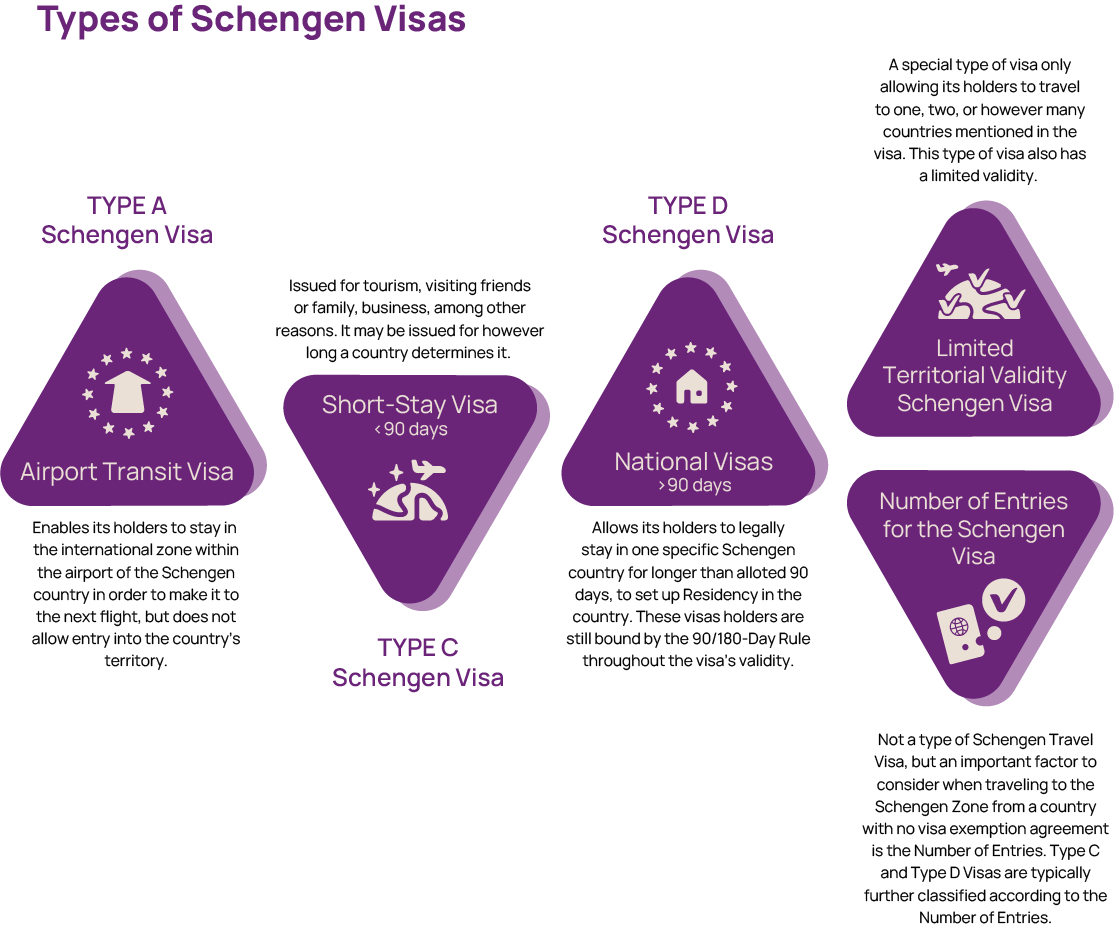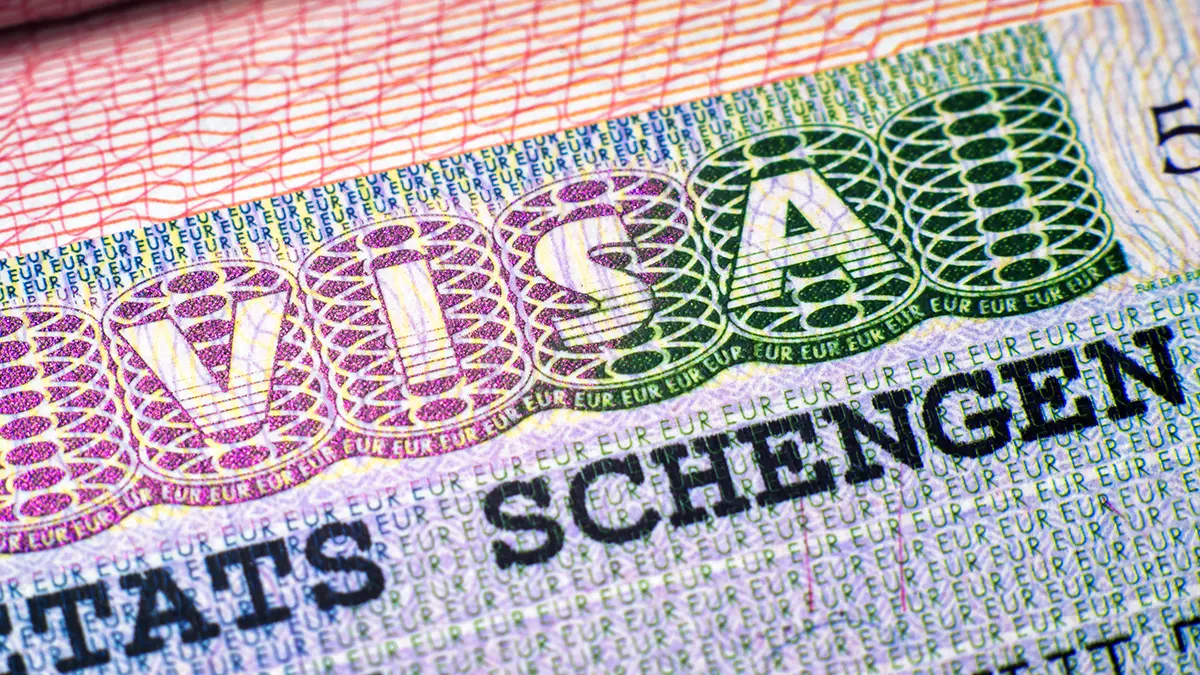The Schengen countries, operating as one entity, hold multiple bilateral treaties, enabling citizens from countries like the United States, Canada and Australia to enter the Schengen Zone without a visa. But what if you come from a country that does not have this type of treaty with the Schengen countries? You can still access the Schengen Area – you will just need to have a visa first.
What are the types of Schengen Visa?
It is important to understand that each Schengen country is sovereign and has its own set of national laws. For example, Portugal may issue a Visa, letting an individual enter its territory, but not the other Schengen countries. However, when it comes to accessing the Schengen Zone, the countries act as one entity and follow the same policies across the board – including the Schengen 90/180-Day rule.
Hence the term “Schengen Visa” - a special kind of visa that can be issued by any country in the Schengen Zone, allowing travellers from countries that do not hold a treaty with the Schengen countries to enter the common travel area. Schengen Visas come in 4 types: A, C, D, and Limited Territorial Validity, and may come with different expiration periods.

Type A Schengen Visa
The Type A Schengen Visa, also known as an Airport Transit Visa, is only applicable when an individual is passing through a Schengen state on a connecting flight between two other non-Schengen countries. This visa enables its holder to stay in the international zone within the airport of the Schengen country in order to make it to the next flight but does not allow actual entry into the country’s territory. If the goal is to enter the Schengen Zone, then the correct type of Visa to pursue is Type C.
Type C Schengen Visa
You may be wondering why there is a Type A and C, but not a Type B Schengen Visa – there used to be, but it became obsolete with the standardized Visa Code, being absorbed into the Type C.
While the Type A is an Airport Transit Visa, the Type B Schengen Visa used to be a Land Transit Visa, allowing holders to travel through Schengen countries by land on the way to a non-Schengen state, provided the trip was no longer than 5 days.
The Type C Visa is the “standard” Schengen Travel Visa, also referred to as the Short-Stay Visa, issued for tourism, visiting friends or family, business, among other reasons. It is carried out by embassies or consulates or any other official visa-related services.
Type C Schengen Visas may be issued for however long a country determines it. This information can also easily be found in the Visa itself. Some visas may be issued for only 15 days, and up to 30 days, 60 days, with the cap usually being 5 years.
Type D Schengen Visa
Type D Schengen Visas, or Long-Term Schengen Visas, also sometimes referred to as National Visas, allows its holders to legally stay in one specific Schengen country for longer than the allotted 90 days – either to live, work or study – to basically set up Residency in the country.
These types of visas are issued in accordance with the country’s specific laws. Type D Visa holders are still bound by the 90/180-Day Rule throughout the visa’s validity period if they decide to travel to another Schengen country.
The only path to bypass this rule is by getting Citizenship in a Schengen state, which unlocks unlimited Schengen Zone travel and the ability to reside in any other Schengen state.
Another thing to consider is that the terms are not mutually exclusive – some National Visas may not be Type D Schengen Visas, and thus not allow entry to the Schengen Zone. It is always advisable to fully investigate the requirements each country has for their National Visas, and if it is classified as a Schengen Visa.
Limited Territorial Validity Schengen Visa
Limited Territorial Validity Schengen Visas are a special type of visa only allowing its holder to travel to one, two or however many countries are mentioned in the visa. In the cases where only one country is mentioned, the individual holding cannot travel to any other Schengen country, not even for transit purposes, either by land or air.
It is not a common type of visa to see in the wild. It is typically not issued unless there is a particular situation, e.g.: humanitarian causes in a specific country, an emergency where it was not possible to get another Schengen Visa ahead of time, among many others. Due to their nature, this type of visas also has a limited validity.
Number of Entries for the Schengen Visa
Despite not being a type of Schengen Travel Visa, one other important factor to consider when traveling to the Schengen Zone from a country with no visa exemption agreement is the Number of Entries.
Type A Schengen Visas, as a transit visa, do not allow any Number of Entries, and are only typically valid for 24 hours, providing leeway to make it until the connecting flight.
Type C and Type D Schengen Visas are typically further classified according to the Number of Entries - this information can be readily found on the Visa itself:
Single-entry – it enables its holder to enter the Schengen Zone only 1 time and expires immediately after its holder leaves the area, regardless of expiration date.
Double-entry – during the overall validity period, double-entry holders can leave the Schengen Zone and enter it once more. However, the visa automatically expires after the second exit even if within the validity period.
Multiple-entry – easily identifiable by the “MULT” marker on the Schengen Visa right next to Number of Entries. This is the quintessential Schengen Visa, and it is the one that allows multiple entries and travel between the Schengen states enables, as long as the 90/180-Day rule is followed if applicable – as some countries’ citizens may only be allowed entry for 30 days, for instance.

EU Citizenship: The Only Workaround Schengen Visas
If you are originally from a country like South Africa, India, or China, this general information may be useful to you, especially to get an essential understanding of how the process broadly works. But - at the end of the day, getting a Schengen Travel Visa can still be a challenging task. It typically involves gathering documentation, in-person interviews and meetings – not to mention the possibility of rejection.
Even if you are from a visa-exempt country, like the United States, the United Kingdom, or the United Arab Emirates, you still have no choice but to leave the Schengen Zone after your 90 days are up, and only be able to return 90 days after. Romania and Bulgaria joined the common travel area recently, and as the Zone grows, workarounds like waiting the time in another non-Schengen country will become increasingly difficult.
Plus – the EU and the EFTA are soon introducing Smart Borders, a new technological system to tighten external borders control. How, then, to simply enjoy limitless travel within the Schengen Zone, free from any restrictions and worries about visa types?
The only real solution is EU Citizenship - as only EU passport holders are allowed to travel visa-free to the Schengen countries AND not to have to worry about overstaying or making calculations about the number of days they have already spent as e.g.: a Spanish citizen is entitled to live, work and study in Croatia.

Investment Programs: The Path to EU Citizenship
Luckily, there are a few attractive investment programs that have EU Citizenship at the end of the line.
The Portugal D2 Visa – and yes, it is right there in the name – is a Schengen Type D Visa, and a National Visa. Though you still have to undergo through the process of obtaining it, you get to live in Portugal, and Portuguese Citizenship at the end of 5 years, and having the Portuguese passport means having EU Citizenship.
Another solution is the Greece Golden Visa, a Greek National Visa that not only sets up Residency in Greece, but also paves the path to the Greek passport and EU Citizenship. The best part about it is that it has a Real Estate option that lands you a beautiful new home in a stunning country – and the Greek passport after 7 years, with no stay requirements.
There is no going wrong with either Portugal or Greece – two Southern, sunny European countries, of which their passport unlocks EU Citizenship, and unlimited, unrestricted travel to the Schengen Zone. And while either option may be challenging to take on your own, it becomes effortless with Investment Visa as your partner.
Unlock Your EU Citizenship with Investment Visa
Investment Visa is a dedicated Residency & Citizenship company with a global reach – from Europe, Middle East, passing through the Caribbean, the South Pacific, and even in North America. We are headquartered in Portugal, and have overseas offices in Greece, the United Kingdom, the United Arab Emirates, and Hong Kong, and we go wherever you are.
Our team of experts and industry leaders travel the world to meet with clients, expats, and investors – all to share their knowledge and insights of how the investment immigration market works, and to advise prospective individuals on how to best capture the second passport, in Europe, or wherever else that may fit their preferences the best.
Contact Investment Visa today and discover more how we can help and guide you through every step the way and unlock your EU Citizenship and never having to ever worry yourself about Schengen Visas ever again.




























































